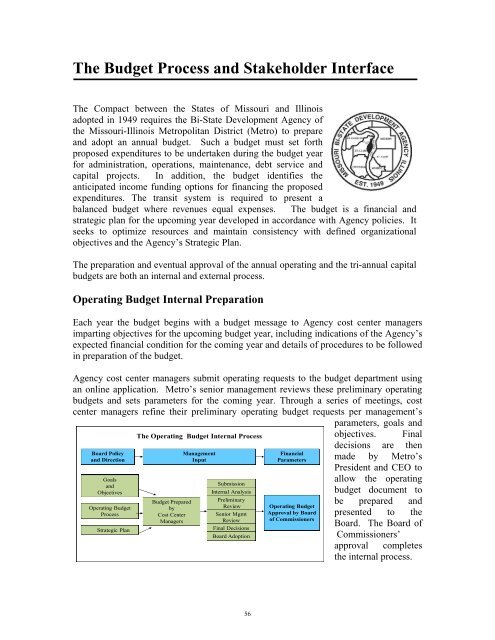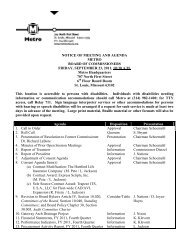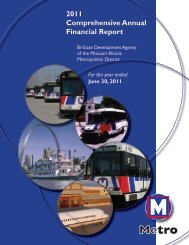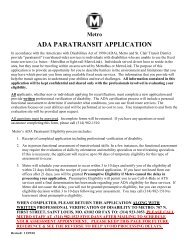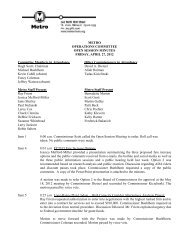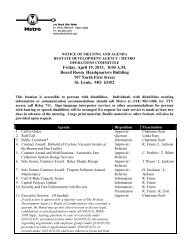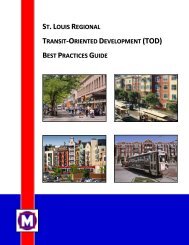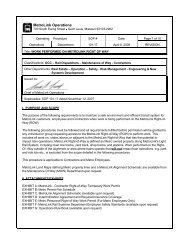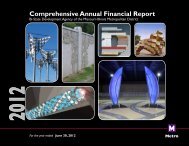FY 2013 Operating and Capital Budget - Metro Transit
FY 2013 Operating and Capital Budget - Metro Transit
FY 2013 Operating and Capital Budget - Metro Transit
Create successful ePaper yourself
Turn your PDF publications into a flip-book with our unique Google optimized e-Paper software.
The <strong>Budget</strong> Process <strong>and</strong> Stakeholder Interface<br />
The Compact between the States of Missouri <strong>and</strong> Illinois<br />
adopted in 1949 requires the Bi-State Development Agency of<br />
the Missouri-Illinois <strong>Metro</strong>politan District (<strong>Metro</strong>) to prepare<br />
<strong>and</strong> adopt an annual budget. Such a budget must set forth<br />
proposed expenditures to be undertaken during the budget year<br />
for administration, operations, maintenance, debt service <strong>and</strong><br />
capital projects. In addition, the budget identifies the<br />
anticipated income funding options for financing the proposed<br />
expenditures. The transit system is required to present a<br />
balanced budget where revenues equal expenses. The budget is a financial <strong>and</strong><br />
strategic plan for the upcoming year developed in accordance with Agency policies. It<br />
seeks to optimize resources <strong>and</strong> maintain consistency with defined organizational<br />
objectives <strong>and</strong> the Agency’s Strategic Plan.<br />
The preparation <strong>and</strong> eventual approval of the annual operating <strong>and</strong> the tri-annual capital<br />
budgets are both an internal <strong>and</strong> external process.<br />
<strong>Operating</strong> <strong>Budget</strong> Internal Preparation<br />
Each year the budget begins with a budget message to Agency cost center managers<br />
imparting objectives for the upcoming budget year, including indications of the Agency’s<br />
expected financial condition for the coming year <strong>and</strong> details of procedures to be followed<br />
in preparation of the budget.<br />
Agency cost center managers submit operating requests to the budget department using<br />
an online application. <strong>Metro</strong>’s senior management reviews these preliminary operating<br />
budgets <strong>and</strong> sets parameters for the coming year. Through a series of meetings, cost<br />
center managers refine their preliminary operating budget requests per management’s<br />
parameters, goals <strong>and</strong><br />
The <strong>Operating</strong> <strong>Budget</strong> Internal Process<br />
objectives. Final<br />
decisions are then<br />
Board Policy<br />
Management<br />
Financial<br />
<strong>and</strong> Direction<br />
Input<br />
Parameters<br />
made by <strong>Metro</strong>’s<br />
President <strong>and</strong> CEO to<br />
Goals<br />
allow the operating<br />
<strong>and</strong><br />
Submission<br />
Objectives<br />
Internal Analysis<br />
budget document to<br />
<strong>Budget</strong> Prepared Preliminary<br />
be prepared <strong>and</strong><br />
<strong>Operating</strong> <strong>Budget</strong><br />
by<br />
Review <strong>Operating</strong> <strong>Budget</strong><br />
Process<br />
Cost Center<br />
Senior Mgmt Approval by Board presented to the<br />
Managers<br />
Review<br />
of Commissioners<br />
Board. The Board of<br />
Strategic Plan<br />
Final Decisions<br />
Board Adoption<br />
Commissioners’xx...x<br />
approval completes<br />
the internal process.<br />
56


